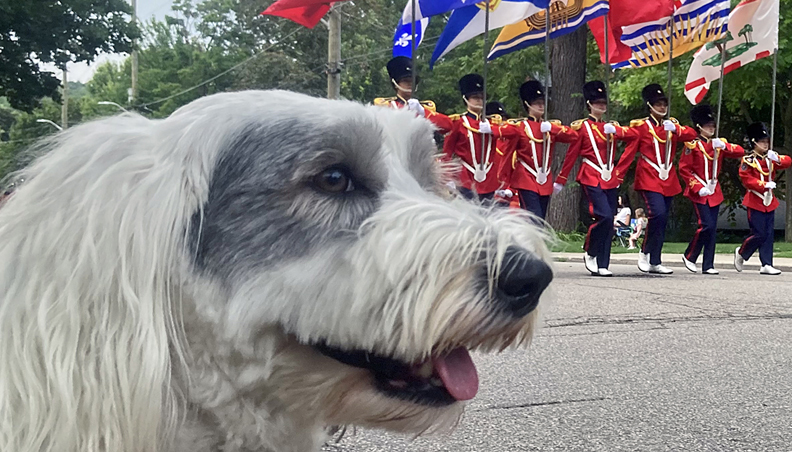
(Thomas Froese photo)
Grace, the Sheepadoodle, watching a parade.
(The Hamilton Spectator – Saturday Oct. 12, 2024)
I’ll never eat Grace, my dog, for Thanksgiving.
And while this seems too wild to even think about, sometimes you can’t state things too clearly in what is the crazy parade of life.
In 2024 it was the cats and so-called single cat-ladies getting attention because of kooky American politics. More kookiness (thank you Donald Trump) followed with the dicey claim that dogs are dinner menu items for some American immigrants.
I’m here to say the obvious. For Thanksgiving, turkey is a better option.
We can thank our American cousins for this also because Canada’s Thanksgiving break was stolen from the Americans in 1879. This after Abe Lincoln officially made Thanksgiving a holiday 16 years earlier. Canada eventually moved its annual festivity from November to October in 1957, largely because of weather.
The first official Thanksgivings were built on what was known of that much-earlier harvest celebration involving Wampanoag First Nations and Pilgrim settlers in 1621. While thanksgiving harvests were already long celebrated by North America’s Indigenous Peoples, that particular meal may or may not have included wild turkey.
Of course, turkey isn’t all the same. When you want to bring some Thanksgiving spirit to your home in, say, Uganda, and order a turkey, you might see it being walked on a leash to your front door. “Uh, Babe, you might want to come and see this.”
Grace, or Gracie as people call her, is quite good off-leash. She’s a Sheepadoodle, a 37-pound bundle of fur and mystery. She loves watching parades, along with squirrels, dogs, people, and the world at large, especially from her front-window perch at our Canadian home.
She wears her name naturally and brings a certain tone, an expectation, to our family’s space. As it says on her doghouse, “Be the person your dog thinks you are.”
This is the thing about us and animals, dogs more than turkeys, Grace an especially telling example. The spirit in animals, called “nephesh” in ancient Hebrew texts, is the same breath of life given to you and me. It connects us and animals in an elemental way.
Sure we have differences. Grace can’t learn, say, aerospace engineering. But she has feelings and emotions and is mysteriously close with people. “She’s beautiful,” they say. So when it comes to us and the animals and sentient awareness, it seems more a question of degree than kind.
This is why even though the animal world (like the human world) can be red with tooth and claw, some animals seem more grace filled than some people.
When Grace looks at me intensely, sometimes it seems like she wants to jump out of her confined dog-self, grab me by the collar and explain how she understands more than I imagine, that someday, in another time and place, we’ll all be grateful to know more about it.
Now it’s Thanksgiving, a holiday that can be a societal corrective as much as anything. Not long ago we couldn’t even meet. Not with closeness or freedom, anyway. Since the pandemic the world has changed. More so, our perspective has changed. Because hard times can often bring an especially thankful spirit. And grace.
So take time when naming your dog. And give thanks for, as Uganda’s children like to say, “the gift of life.” I recently learned of a family from church that was shaken by death. It was mom. Her husband found her dead on the couch one morning from a heart attack. She was my age.
This is it. Life itself is grace. The sun rising every morning is grace, even as the darkness, that sweet sleep, falling into dreams and places that we can’t even remember, is grace. Dawn to dusk to dawn, it’s all grace.
In a time when words are becoming increasingly meaningless, here’s one that over the centuries has kept its shine. This weekend I’m thankful for Grace the dog who reminds me of it by simply being herself.

Thanks for always challenging us. Thanks for the reminder about Grace. Even more importantly, thanks for the reminder to always be grateful.
Nicely done, Thom.